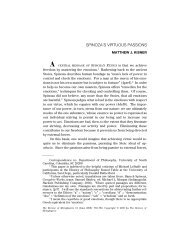heidegger's being and time and national socialism - Philosophy ...
heidegger's being and time and national socialism - Philosophy ...
heidegger's being and time and national socialism - Philosophy ...
Create successful ePaper yourself
Turn your PDF publications into a flip-book with our unique Google optimized e-Paper software.
third one has been counted as truth <strong>and</strong> the more<br />
primary ones have been covered up. 74<br />
In sum, in the discussion of each existential in<br />
Division One of Being <strong>and</strong> Time Heidegger characterizes<br />
modern life <strong>and</strong> modern philosophy as a<br />
double forgetting, as a formation that is derivative<br />
<strong>and</strong> that covers up its relation to its origin <strong>and</strong><br />
claims to st<strong>and</strong> on its own feet. The mode of underst<strong>and</strong>ing<br />
other Dasein practiced by the modern<br />
individual covers up a primary underst<strong>and</strong>ing<br />
without which it would not be possible, <strong>and</strong> the<br />
modern philosophers interpret everything in<br />
terms of substances <strong>and</strong> cover up the dimension<br />
of the world. In addition, in the discussion of the<br />
They as well as in the one of truth, the last section<br />
in Division One, Heidegger indicates that the origin<br />
was present <strong>and</strong> acknowledged in the past. 75<br />
These two features are the first part of the structure<br />
of temporalized metaphysics <strong>and</strong> in Division<br />
Two of Being <strong>and</strong> Time Heidegger enacts the second<br />
part, the return of the origin. Already in the<br />
section on the They Heidegger emphasizes—<br />
without giving examples but often in a pretty derogatory<br />
tone—that the They <strong>and</strong> fallen Dasein<br />
cover up new possibilities. 76 These sentences<br />
already address the issue of the return of the<br />
origin.<br />
Death, Conscience, <strong>and</strong> Temporality<br />
in Division Two of Being <strong>and</strong> Time<br />
For liberals <strong>and</strong> social democrats, there was<br />
no divergence between the “real” logic of history<br />
<strong>and</strong> the individuals’ underst<strong>and</strong>ing of the working<br />
of history, <strong>and</strong> the individuals assumed that<br />
their political activities—the promotion of liberalism<br />
or social democracy—were in line with the<br />
forward flow of history itself. By contrast,<br />
rightists <strong>and</strong> communists assumed that in the<br />
kairos, in the decisive moment, it became patent<br />
that the “real” logic of history—its main actor<br />
<strong>and</strong> its temporality—differed from what the liberal<br />
<strong>and</strong> social democratic followers of progress<br />
had thought about it. From that moment on, the<br />
“intention” of history has to be realized by the<br />
“proxy” of history against the resistance of liberals<br />
<strong>and</strong> social democrats (<strong>and</strong> communists or<br />
rightists, respectively). 77 As was already said,<br />
PHILOSOPHY TODAY<br />
262<br />
rightists <strong>and</strong> communists turned in opposite directions,<br />
communists—like the social democrats<br />
but with different means <strong>and</strong> toward an end further<br />
down the road—toward a new society while<br />
rightists re-realized in the name of destiny a past<br />
community that had been pushed aside by society.<br />
According to Scheler, there is the level of our<br />
explicit <strong>and</strong> conscious ethical norms <strong>and</strong> judgments,<br />
B, <strong>and</strong> below it the fundamental <strong>and</strong> primary<br />
level of our, often unconscious, ethical feelings,<br />
A. After its establishment, the ethics of<br />
liberalism or society on level B had been supported<br />
for some <strong>time</strong> by the corresponding feelings<br />
on level A. However, at some point destiny<br />
begins to be active. Already before it openly enters<br />
the stage of history <strong>and</strong> delivers its comm<strong>and</strong>,<br />
it spreads new feelings on level A <strong>and</strong> on<br />
level A renews the ethos of community. From<br />
that point on, people sense more <strong>and</strong> more that<br />
there is something new in the air, <strong>and</strong> the ethics of<br />
liberalism <strong>and</strong> social democracy become beleaguered.<br />
Liberals <strong>and</strong> social democrats try to<br />
ignore <strong>and</strong> suppress the new, but they will finally<br />
be washed away when the ethics of community<br />
will reestablish itself also on level B. 78<br />
Heidegger’s theory of a double forgetting at<br />
work in modern philosophy <strong>and</strong> society corresponds<br />
to the theories of Scheler before his turn<br />
<strong>and</strong> Lukács regarding the discrepancy between<br />
the assumptions about history <strong>and</strong> its “real”<br />
logic. When destiny raises its voice, Dasein recognizes,<br />
as in Scheler but not in Lukács, destiny<br />
<strong>and</strong> community as the main players, <strong>and</strong> Dasein<br />
also recognizes that its narrative of progress <strong>and</strong><br />
autonomy falsifies the loss of community as an<br />
improvement. In his theory of the modes of solicitude,<br />
Heidegger disapproves of liberalism <strong>and</strong><br />
social democracy, <strong>and</strong> moves to the right <strong>and</strong> not<br />
to the extreme left. With his statements, just mentioned,<br />
about inauthentic Dasein suppressing<br />
new possibilities Heidegger repeats Scheler. In<br />
Division Two, Heidegger treats the way out of<br />
fallenness—the issue of authenticity—<strong>and</strong> the<br />
temporal interpretation of the existentials. I present<br />
the notions of death, conscience, <strong>and</strong> the temporal<br />
interpretation of the existentials before returning,<br />
in the next section, to §74 for a summary<br />
of my interpretation of its decisive sentences.
















